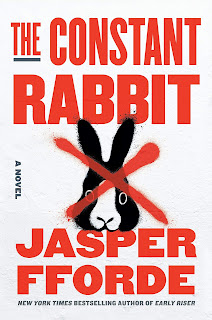So I don't think I'll try to get too deeply into the anger behind the metaphor; I think I would misplace or mischaracterize it at best. But I know it's there, and anyone reading The Constant Rabbit will know that as well.
This is a 2020 novel, set in 2022 - an alternate near-future at the time it was written. Some sixty years before - in 1965 - an Inexplicable Spontaneous Anthropomorphizing Event turned a couple of dozen rabbits [1] into bipedal intelligent people, who became part of British society as another minority group and whose numbers have grown since then to a little over one million.
But this 2022 UK, while similar to ours in many ways - Brexit, pointedly, happened here as well - has adapted by making those rabbits legally second-class citizens, imposing a maximum wage on them, forcing most of them to live in rabbit-only restricted areas and elevating the UKARP - no prizes for working out the acronym of the UK Anti-R. Party - to government for most of the past several decades. And most Britons are casually racist about "the rabbit," with the standard fear being the LitterBomb, that the mass of rabbits would suddenly all have large litters quickly and continuously to overwhelm the human population and take over. [2]
So: we are in a small English village: Much Hemlock. It is conservative, both politically and in the ways of small towns everywhere. A rabbit family is about to move in. And we will see it through the eyes of Peter Knox, about as squishy a leftie as the town has, but who also works for the Rabbit Compliance Taskforce, the not-at-all-secret police that control and manage all rabbits.
The plot circles Peter and Constance Rabbit, his new neighbor and, coincidentally, an acquaintance of his from university, in the brief period before rabbits were forbidden higher education. We learn how weasels and foxes fit into this society - spoiler: vastly more privileged than rabbits - and the sordid workings of RabCoT. We see the cruel racism of the organization TwoLegsGood, and we may come to think that Fforde is striking us about the head with his ideas rather more forcefully than he usually does.
I return to my original point about anger: this is a very angry book, but it's a cold, deliberate anger...I might say a very British anger. Fforde has his thumb on the scales for every page of The Constant Rabbit, and it would be a very odd reader who can sustain a point of view different from the one Fforde is driving.
This feels shorter and much more pointed than Fforde's usual novels: he's always written about mildly dystopian societies, where things work badly and for the benefit of an entrenched hierarchy, but he's never been this obvious and blatant about tying that to the present-day. This may be a bit disappointing to Fforde fans for that reason: there's a constant background hum of axes grinding here, and even if you think those axes are right, the sound is still unpleasant and distracting.
[1] "There had also been six weasels, five guinea pigs, three foxes, a Dalmatian, a badger, nine bees and a caterpillar." (p.84) The narrative also mentions two known similar events elsewhere in the world, and possibly many more that were suppressed violently.
[2] I assume this is meant to be patently foolish, because even if bipedal rabbits can breed at the speed and in the numbers of non-sapient rabbits, there still has to be a longer period to grow a man-sized rabbit to maturity and taking care of millions of babies is not an easy thing for anyone. Plus, you know, a LitterBomb would be hugely obvious immediately and that rabbits don't have any political power and they're pretty much fanatically nonviolent.

No comments:
Post a Comment